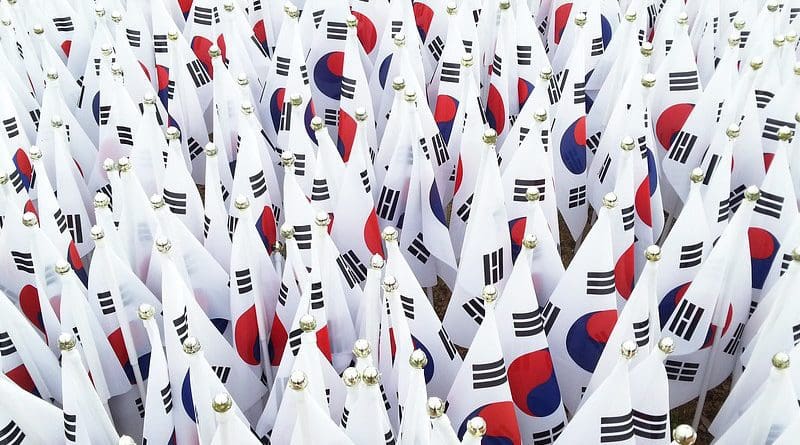South Korea’s Nuclear Paradox – Analysis
By IPCS
By Shivani Singh
South Korea faces a paradox of choice. On one hand, it must address growing domestic public pressure in favour of acquiring nuclear weapons to combat the North Korean threat. On the other, this decision must be weighed against Seoul’s rapid nuclear energy expansion, which could suffer a setback if accompanied by nuclear weapons development as the latter might invite sanctions.
What factors drive these fundamentally incompatible goals? And why are they incompatible in the South Korean context?
The Nuclear Deterrent Debate
The growing North Korean threat has renewed domestic debates around waning trust in America’s extended deterrence guarantee and the viability of an independent South Korean nuclear deterrent. This erosion of allied trust in the US nuclear umbrella is not new and dates back to the Obama and Trump administrations’ inconclusive policies towards North Korea.
The 2013 US-South Korea agreement aimed to establish a tailored deterrence strategy against North Korean nuclear weapons to ensure “a full [range] of military capabilities, including the US nuclear umbrella, conventional strike, and missile defense capabilities.” In a show of good faith given the worsening security situation in the region and to boost deterrence, the strategy was updated in November 2023. Despite this, over 60 per cent South Koreans registered a lack of trust in the US nuclear umbrella and over 71 per cent favouredthe country building its own nuclear weapons.
The massive support for nuclear weapons in South Korea is not surprising, especially following a spate of provocative North Korean actions over the past two years. Pyongyang is reported to have conducted close to 80 ballistic missile tests since 2022, and a series of intercontinental ballistic missile tests in 2017, 2022, and 2023. The most recent addition is the test launch of its new-generation strategic cruise missile, Pulhwasal-3-31, and nuclear-capable “underwater attack drone” Haeil-5-23, to deter military manoeuvres by the US and allied navies through the creation of large radioactive explosions underwater. More importantly, Kim’s recent declaration on the impossibility of Korean reunification and calling South Korea a belligerent, enemy state has hiked up tensions. Kim’s charged statement and rapid nuclear modernisation could be an attempt to leverage declining US credibility over the Russia-Ukraine war and apprehension regarding the upcoming US presidential elections, and use both to North Korea’s advantage.
Meanwhile, the Biden administration has come under the scanner for its rather hawkish and inflexible approach towards North Korea, further deepening a lack of trust in US policy. Apart from the uncompromising goal of eliminating North Korea’s nuclear arsenal, there seems to be no clarity in US strategy. Denuclearisation of the Korean peninsula is a Sisyphean task, especially now, with an evident shift in Supreme Leader Kim Jong-Un’s focus: from achieving rapprochement with South Korea to having its nuclear-armed status internationally legitimised.
Ramping Up Nuclear Energy Trade
The other side of the nuclear dilemma are the economic imperatives of nuclear energy expansion. Public attitudes in South Korea concerning civil uses of nuclear energy and construction of nuclear power plants are largely positive. A 2021 poll showed that 72.1 per cent of respondents supported the use of nuclear power to meet energy needs. A 2022 survey showed majority support for nuclear energy, at 69.2 per cent. The quandary for South Korea, however, lies in pursuing the incompatible twin goals of nuclear energy and nuclear weapons. Unlike his predecessor, South Korean President Yoon Suk Yeol is leading an expansive nuclear energy campaign which requires cooperation from Western allies.
The 26 reactors in operation in South Korea meet 27.8 per cent of the country’s electricity needs. Seoul plans to ramp up production to a minimum 30 per cent of total electricity by 2030 and 34.6 per cent by 2036. South Korea further plans to boost investment in its nuclear export industry, confirming an export target of 10 nuclear power plants by 2030, which includes developing Small Modular Reactors (SMRs). To meet these ambitious targets, the Yoon government announced a stream of nuclear projects with several countries. These include a November 2023 clean energy partnership with the UK to boost low-carbon, civil nuclear energy; an agreement with the Netherlands in December 2023 for the construction of new nuclear power plants; and talks of supplying SMRs to African countries.
Moreover, the US-RoK civil nuclear partnership is guided by a 1974 agreement that was further extended for 20 years in 2015. The agreement imposes strict restrictions on uranium enrichment and spent fuel reprocessing, which are required to make a nuclear bomb. Violation of the agreement can invite automatic US sanctions and termination of international nuclear cooperation, thus adversely affecting nuclear industry. South Korea is also party to the Nuclear Non-Proliferation Treaty (NPT), an IAEA safeguards agreement, and has signed the Additional Protocol, and any violation violating can further jeopardise nuclear energy expansion.
Yoon is unlikely to risk the favourable uptick in nuclear commerce and profitable collaborations by promoting nuclear weapons talk. This is visible in the stark change in his stance: from hinting in early 2023 that South Korea could “get its own nuclear arms if the security situation in North Korea worsens,” to the present-day position, which is that South Korea “would not seek its own nuclear deterrent in the face of threats from nuclear-armed North Korea.” This change can attributed to the threat of sanctions should Seoul go down the nuclear weapons route, which would “ruin a trade-dependent economy.”
The Yoon government has its work cut out. Managing domestic pressures for a nuclear deterrent against mushrooming nuclear energy contracts—and needs—is going to be a tough balancing act.
Shivani Singh is Senior Researcher with IPCS’ Nuclear Security Programme (NSP).

